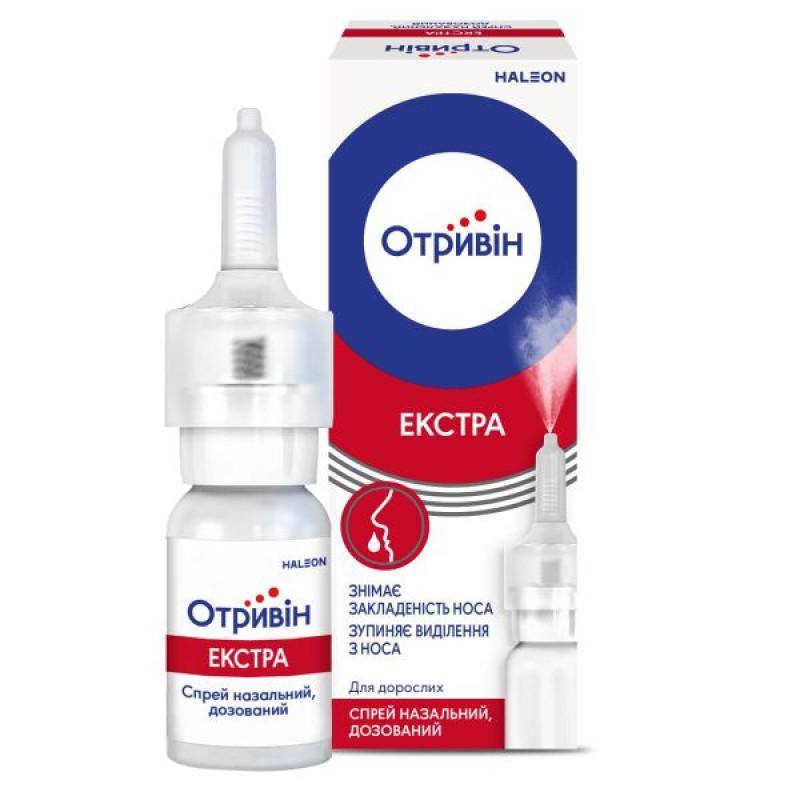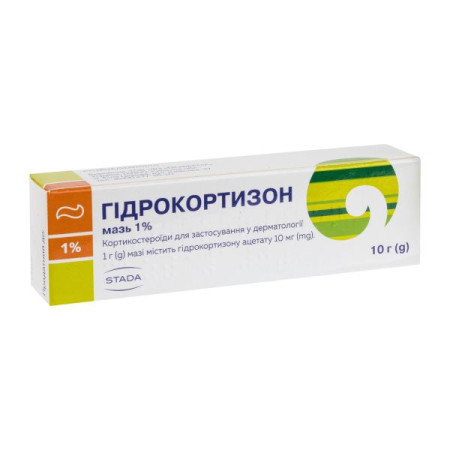Otrivin extra nasal spray dosed bottle 10 ml

Instructions for Otrivin Extra nasal spray, 10 ml dosed bottle
Composition
active ingredients: xylometazoline hydrochloride, ipratropium bromide;
1 ml of the drug contains xylometazoline hydrochloride 0.5 mg, ipratropium bromide 0.6 mg;
excipients: disodium edetate, dihydrate; glycerin (85%); concentrated hydrochloric acid (for pH adjustment); sodium hydroxide (for pH adjustment); purified water.
Dosage form
Nasal spray, metered.
Main physicochemical properties: clear solution. Colorless or slightly colored solution.
Pharmacotherapeutic group
Drugs used in diseases of the nasal cavity. Anti-edematous and other drugs for local use in diseases of the nasal cavity. Sympathomimetics in combination with other drugs (except corticosteroids). Xylometazoline. ATX code R01A B06.
Pharmacological properties
Pharmacodynamics
Xylometazoline belongs to the group of local vasoconstrictors (decongestants) with alpha-adrenomimetic action, causes narrowing of the blood vessels of the nasal mucosa, thus eliminating swelling and hyperemia of the nasopharyngeal mucosa. Facilitates nasal breathing in rhinitis.
Ipratropium bromide is a quaternary ammonium compound with anticholinergic effects. When administered intranasally, it reduces nasal secretion by competitively inhibiting cholinergic receptors located in the nasal epithelium.
Pharmacokinetics
The action of xylometazoline begins in 5-10 minutes and lasts for 6-8 hours.
The action of ipratropium usually begins within 15 minutes and lasts on average for 6 hours. In therapeutic concentrations, it does not irritate the mucous membrane, does not cause hyperemia. When applied topically, the drug is poorly absorbed, the active components are present in the blood plasma in insignificant quantities. There is some weakening of the action of ipratropium, while the maximum concentrations of xylometazoline are slightly increased.
Indication
Symptomatic treatment of acute respiratory diseases with symptoms of rhinitis (runny nose) and rhinorrhea.
Contraindication
Hypersensitivity to the active ingredients of the drug or excipients; hypersensitivity to atropine or similar agents, e.g. hyoscyamine, scopolamine; period after surgical interventions on the dura mater, e.g. after transsphenoidal hypophysectomy or other transnasal operations; acute coronary disease, coronary asthma; hyperthyroidism; glaucoma; dry rhinitis.
Interaction with other medicinal products and other types of interactions
Monoamine oxidase inhibitors (MAO inhibitors). Otrivin Extra should not be used for concomitant therapy with MAO inhibitors and within 2 weeks after their discontinuation. Sympathomimetic drugs cause the release of catecholamines, which leads to an intense release of noradrenaline, which, in turn, has a vasoconstrictor effect, resulting in an increase in blood pressure.
In the event of a critical increase in blood pressure, treatment with Otrivin Extra should be discontinued and symptomatic treatment should be prescribed.
Tri- and tetracyclic antidepressants: Use with sympathomimetic drugs may enhance the sympathomimetic effect of xylometazoline, therefore this combination is not recommended.
With concomitant administration of other anticholinergic drugs, an increase in the anticholinergic effect is possible.
The above interactions have been studied separately for each active component of the drug, not when used in combination.
Application features
Otrivin Extra should be used with caution in patients prone to the development of angle-closure glaucoma, patients with prostatic hypertrophy and bladder neck stenosis.
It is unacceptable to spray the drug into or around the eyes.
In case of eye contact, the following reactions may occur: temporary blurred vision, irritation, pain, redness of the eyes. Exacerbation of angle-closure glaucoma may develop. Patients should be advised to rinse their eyes with cold water if the drug gets into their eyes and to seek medical attention if eye pain or blurred vision occurs.
It is recommended to use the drug with caution in patients who are prone to nosebleeds (especially elderly patients), paralytic ileus, and patients with cystic fibrosis.
Patients sensitive to adrenergic drugs may experience sleep disturbances, dizziness, tremor, cardiac arrhythmias or increased blood pressure. Otrivin Extra should be used with caution in patients with diabetes mellitus, arterial hypertension, cardiovascular diseases or pheochromocytoma.
Immediate hypersensitivity reactions, including urticaria, angioedema, rash, bronchospasm, laryngeal edema, and anaphylactic reactions, are possible.
The duration of treatment should not exceed 7 days. Long-term treatment with xylometazoline may cause swelling of the nasal mucosa and increased secretion, which is due to increased sensitivity of the cells - the opposite effect (rhinitis medicamentosa).
Ability to influence reaction speed when driving vehicles or other mechanisms
Visual disturbances (including blurred vision and dilated pupils), dizziness and fatigue may occur during the use of the drug. Patients should be warned that if such reactions occur, they should avoid driving or operating machinery and should not participate in activities that could endanger their health or life.
Use during pregnancy or breastfeeding
There is insufficient data on the use of the drug during pregnancy. The drug should not be prescribed during pregnancy unless clearly necessary (after a careful benefit/risk assessment).
There is no data on the penetration of ipratropium bromide and xylometazoline into breast milk. The systemic effect of ipratropium bromide and xylometazoline hydrochloride is low. Otrivin Extra, if necessary, is used after assessing the ratio of the expected benefit to the mother and the risk to the infant. It is unacceptable to exceed the recommended dose.
Fertility. There are no data on the effect of the drug on fertility. The systemic exposure of the drug components is low. Therefore, the effect of the drug on fertility is unlikely.
Method of administration and doses
Intranasal. Do not cut off the tip of the spray pump. Nasal spray, metered, ready to use.
The recommended dose for adults is 1 spray 3 times a day in each nasal passage. The interval between the use of Otrivin Extra should be at least 6 hours. The drug is used no more than 3 times a day in each nasal passage.
The duration of treatment should not exceed 7 days.
After the symptoms of the disease disappear, it is recommended to discontinue treatment with the drug to minimize the risk of developing adverse reactions.
Experience with the use of the drug in elderly patients (over 70 years of age) is limited.
Before first use, prime the sprayer by pressing the sprayer 4 times. The sprayer will then be ready to spray for the entire treatment period. If the spray does not spray when the sprayer is pressed or the product has not been used for more than 6 days, the sprayer pump must be primed again by pressing the sprayer 4 times into the air.
One injection (approximately 140 μl) of Otrivin Extra contains approximately 70 μg xylometazoline and 84 μg ipratropium bromide.
Children
There is insufficient data on the use of the drug in children (under 18 years of age), therefore the drug is not used in this category of patients.
Overdose
With excessive use of xylometazoline, the following phenomena are possible: severe dizziness, sweating, a sharp decrease in body temperature, headache, bradycardia, arterial hypertension, respiratory depression, coma and convulsions. After arterial hypertension, arterial hypotension may develop. Children are more sensitive to manifestations of toxicity than adults. Treatment is symptomatic.
In case of excessive use of ipratropium bromide, overdose is unlikely due to extremely low absorption into the blood, but the following symptoms may develop: dry mouth, accommodation disorders, tachycardia.
Symptomatic treatment
A significant overdose may cause anticholinergic symptoms from the central nervous system, including hallucinations, for the elimination of which cholinesterase inhibitors are prescribed.
Appropriate supportive measures are necessary for all persons suspected of overdose; emergency symptomatic therapy under medical supervision is prescribed as necessary. The patient should be observed for at least 6 hours. In the case of severe overdose with cardiac arrest, resuscitation measures should be carried out for at least 1 hour.
Adverse reactions
The most common adverse reactions are nosebleeds (14.8%) and dry nose (11.3%).
Adverse effects are classified by frequency of occurrence into the following categories: very common (≥ 1/10), common (≥ 1/100 - < 1/10), uncommon (≥ 1/1000 - < 1/100), rare (≥ 1/10,000 - < 1/1000), very rare (< 1/10,000), unknown (frequency not determined from available data, also includes isolated cases).
Immune system disorders: unknown - hypersensitivity.
Psychiatric disorders: uncommon – insomnia.
From the nervous system: often - dysgeusia, headache; infrequently - parosmia, paresthesia, dizziness, tremor.
On the part of the organs of vision: infrequently - visual impairment, dry eyes; unknown - accommodation disorders, exacerbation of angle-closure glaucoma, photopsia, eye irritation and pain, increased intraocular pressure, blurred vision, halo presence, pupil dilation.
From the cardiovascular system: infrequently - palpitations, tachycardia; unknown - atrial fibrillation.
Respiratory, thoracic and mediastinal disorders: very common - epistaxis, dry nose; common - discomfort, dry throat, burning sensation/pain in the nose or throat, hypersecretion, nasal congestion; uncommon - irritation of the nasal mucosa, nasal mucosal ulcers, nasopharyngitis, sneezing, cough, dysphonia; rare - rhinorrhea; not known - discomfort in the paranasal sinuses, laryngospasm, laryngeal edema.
From the digestive tract: often - dry mouth; infrequently - dyspepsia, nausea; unknown - dysphagia.
Renal and urinary disorders: unknown - urinary retention.
General disorders and administration site conditions: uncommon - feeling of discomfort, increased fatigue; unknown - chest discomfort, feeling of thirst, allergic reactions, including angioedema of the tongue, lips, face, anaphylactic reactions.
Reporting suspected adverse reactions to a physician after a drug is approved is important. This allows continued monitoring of the benefit/risk balance of the drug.
Expiration date
3 years.
Storage conditions
Store at a temperature not exceeding 25 °C, out of the reach of children. Do not freeze.
Packaging
10 ml in a bottle with a dosing device. 1 bottle in a cardboard pack.
Vacation category
Without a prescription.
Producer
GSK Consumer Helsker S. A.
Location of the manufacturer and its business address
Rue de Letra, 1260 Nyon, Switzerland.
There are no reviews for this product.
There are no reviews for this product, be the first to leave your review.
No questions about this product, be the first and ask your question.








